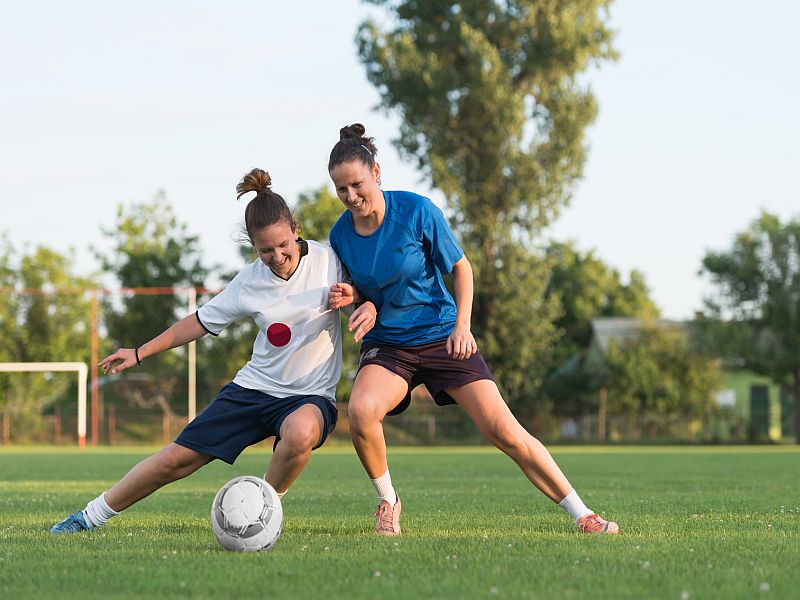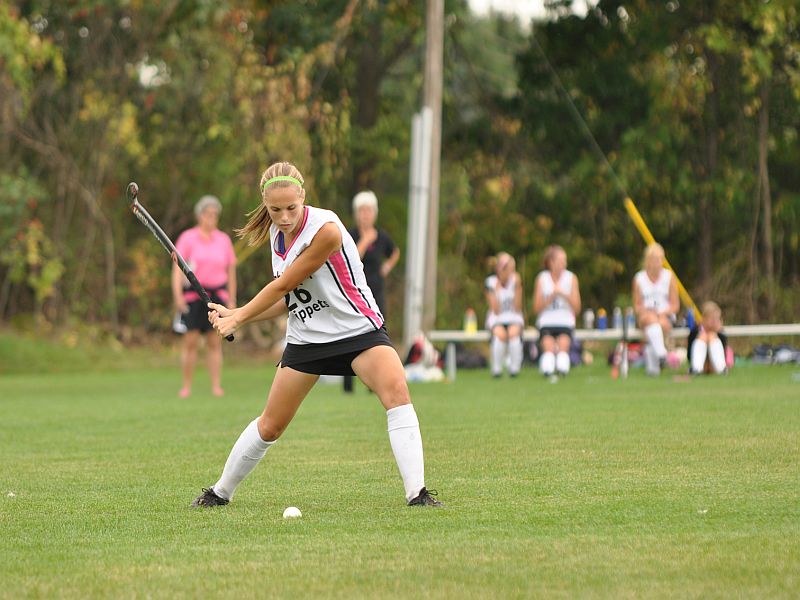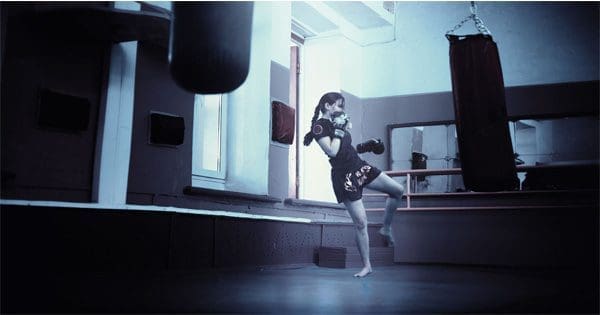Female Athletes: As kids play sports like soccer and football with more frequency and force, many are damaging their knees, a new study finds.
A common knee injury — an anterior cruciate ligament (ACL) tear — has steadily increased among 6- to 18-year-olds in the United States, rising more than 2 percent a year over the last two decades, researchers report.
These injuries peak in high school, said lead researcher Dr. Nicholas Beck.
Table of Contents
Girls Have A Higher Rate Of ACL Injuries
Added Beck, an orthopedic surgery resident at the University of Minnesota.
Sports that involve cutting or pivoting — such as soccer and basketball — are the riskiest for ACL tears. And contact sports like football can further increase the risk. But ACL tears can occur in tennis and volleyball, too, the researchers noted.
Study co-author Dr. Marc Tompkins said the researchers didn’t look at why ACL tears are on the rise.
But, he said, “one potential cause is the year-round sports specialization that is occurring in kids at an earlier age.” Tompkins is an assistant professor of orthopedic surgery at the University of Minnesota.
Instead of getting cross-training from multiple sports and therefore using different muscle groups, this means the kids do the same thing over and over. This can lead to fatigue and an increased potential for injury, including ACL injury, Tompkins explained.
“Another potential cause is that children female athletes play with more intensity and force than 20 years ago, which may put the body at increased risk of injury,” he added.
More girls are playing sports, which could affect injury rates, the study authors said. And it’s also possible that rates are up “because we are getting better as a medical community at diagnosing ACL injury,” Tompkins suggested.
Beck hopes this study will increase awareness of ACL tears in young female athletes and promote interest in prevention programs or developing athletic participation guidelines.
The anterior cruciate ligament sits in the center of the front of the knee. It’s one of the ligaments that holds the knee bones together. When it tears, the ligament splits into two, causing knee instability, according to the American Academy of Orthopaedic Surgeons.
When a tear occurs, you might hear a popping sound and your knee may give out from under you. Depending on the severity of the injury, treatment can range from physical therapy to surgery.

“ACL injuries are serious in the short term because they generally require six months’ to a year’s worth of hard recovery work before going back to sports. And even then it often takes longer to get back to pre-injury function,” Tompkins said.
“ACL injuries are serious in the long term, too, because we know that even if they recover well with or without surgery, the risk of developing arthritis in the injured knee is higher than before the injury,” he added.
Dr. Stephen Swirsky is an orthopedic surgeon at Nicklaus Children’s Hospital in Miami. He said one of the best ways to reduce injuries is to teach good running techniques, which will improve function and agility.
“We have developed an injury prevention program, and we try to reduce the rates of ACL injuries,” Swirsky said.
“In addition, kids need to be on a flexibility and stretching program,” he advised. “The more flexible they are, the less likely they are to have an injury.”
When ACL tears do happen, Swirsky said, he recommends a comprehensive rehab program after surgery. This is accompanied by advice for reducing the risk of injury when young patients return to play.
To study the trends in ACL tears among U.S. children and teens, the study authors used insurance billing data for patients aged 6 to 18 from 1994 to 2013.
The researchers found that girls of all ages experienced a significant increase in the incidence of ACL tears over 20 years. In boys, however, only those aged 15 to 16 showed such an increase.
The report was published online Feb. 22 in the journal Pediatrics.
SOURCES: Nicholas Beck, M.D., resident, department of orthopaedic surgery, University of Minnesota, Minneapolis; Marc Tompkins, M.D., assistant professor, department of orthopaedic surgery, University of Minnesota, Minneapolis; Stephen Swirsky, D.O., orthopedic surgeon, Nicklaus Children’s Hospital, Miami; Feb. 22, 2017, Pediatrics, online
News stories are written and provided by HealthDay and do not reflect federal policy, the views of MedlinePlus, the National Library of Medicine, the National Institutes of Health, or the U.S. Department of Health and Human Services.

Concussions More Likely In Female Athletes

Female athletes appear to be more likely than men to suffer concussions during their careers on the field, a new study suggests.
The findings add to the existing evidence that female athletes may be more susceptible to concussions, even as attention has tended to focus on the risk to male football players.
“The more we look at concussion, the more we realize that women are at high risk,” said study co-author Dr. James Noble. He’s an assistant professor of neurology at Columbia University Medical Center in New York City.
Once a concussion occurs, however, the gender gap dwindles, the researchers found.
“For the most part, men and women experience concussion in about the same way,” Noble said, “although men were more likely to report forgetfulness and women more likely to report sleep problems.”
Concussions, especially among football players from high school to professional levels, have gotten intense attention in recent years.
Last year, a study suggested that concussion diagnoses more than doubled from 2007 to 2014, with especially big jumps among children and teens. It’s not clear, though, how much of the increase is due to increased awareness of concussions or a higher number of injured young people.
In the new study, the researchers tracked more than 1,200 athletes from Columbia University from 2000 to 2014. More than 800 were male, and almost 400 were female.
The Athletes All Played Sports Believed To Pose A Higher Risk Of Concussions
For women, the sports included field hockey, soccer, basketball, softball and lacrosse, said study lead author Cecilia Davis-Hayes, a medical student at Columbia.
For men, the sports initially included just football but then also included wrestling, basketball and soccer, Davis-Hayes said.
Twenty-three percent of the women and 17 percent of the men had at least one concussion during their college careers over the time of the study.
The difference “doesn’t sound like much, but it’s almost 50 percent more, meaning it’s 50 percent more likely for women to get a concussion than men,” Noble said.
Concussions in sports typically happen when athletes run into each other or hit the ground, Noble said. According to Davis-Hayes, lacrosse and soccer are especially physical sports for women with “a lot of contact on every play.”
Levels of most concussion symptoms were similar among the men and women, although forgetfulness was more common for men (44 percent reported it, compared to 31 percent of the women). Women were more likely to experience insomnia (42 percent, compared to 29 percent of men).
The researchers found that it took an average of almost two weeks for the athletes to return to play, although Davis-Hayes said that’s skewed because some players took especially long — months — to recover. The study didn’t look at how the female athletes were treated for their concussions.
The study also didn’t take into account how long female athletes played each sport. That means researchers don’t know if the women or men were on the field for longer periods, potentially boosting their risk of concussion.
Why might women face a higher risk? It’s not clear, Noble said, although he thinks it could be due to a variety of factors, such as differences in the bodies of men and women.
“Is there something about how the head moves in a woman versus a man?” he said.
Steven Broglio, director of the NeuroTrauma Research Laboratory at the University of Michigan, said the findings fit with other research.
“There are a multitude of studies that have shown that women participating in similar sports as men — like soccer, basketball, baseball/softball — report concussions at a higher rate. Concussions are not just a football or male injury,” he said.
Broglio also noted that the new study results suggest men and women recovered at the same speed. “Historically, we believed women took longer to recover from injury,” he said, “but there is growing evidence suggesting this may not be the case.”
The study authors said larger studies could offer more insight into the differences between the genders when it comes to concussion.
The study was to be presented Tuesday at the annual meeting of the American Academy of Neurology, in Boston. Studies released at medical conferences are typically considered preliminary until published in peer-reviewed journals.
SOURCES: James Noble, M.D., assistant professor, neurology, and Cecilia Davis-Hayes, medical student, Columbia University Medical Center, New York City; Steven Broglio, Ph.D., director, NeuroTrauma Research Laboratory, and concussion lead, University of Michigan Injury Center, Ann Arbor; Feb. 28, 2017, American Academy of Neurology meeting, Boston
News stories are written and provided by HealthDay and do not reflect federal policy, the views of MedlinePlus, the National Library of Medicine, the National Institutes of Health, or the U.S. Department of Health and Human Services.
How Nastia Liukin Keeps Her Body In Balance

Related articles
Post Disclaimer
Professional Scope of Practice *
The information on this blog site is not intended to replace a one-on-one relationship with a qualified healthcare professional or licensed physician and is not medical advice. We encourage you to make healthcare decisions based on your research and partnership with a qualified healthcare professional.
Blog Information & Scope Discussions
Welcome to El Paso's Premier Wellness and Injury Care Clinic & Wellness Blog, where Dr. Alex Jimenez, DC, FNP-C, a board-certified Family Practice Nurse Practitioner (FNP-BC) and Chiropractor (DC), presents insights on how our team is dedicated to holistic healing and personalized care. Our practice aligns with evidence-based treatment protocols inspired by integrative medicine principles, similar to those found on this site and our family practice-based chiromed.com site, focusing on restoring health naturally for patients of all ages.
Our areas of chiropractic practice include Wellness & Nutrition, Chronic Pain, Personal Injury, Auto Accident Care, Work Injuries, Back Injury, Low Back Pain, Neck Pain, Migraine Headaches, Sports Injuries, Severe Sciatica, Scoliosis, Complex Herniated Discs, Fibromyalgia, Chronic Pain, Complex Injuries, Stress Management, Functional Medicine Treatments, and in-scope care protocols.
Our information scope is limited to chiropractic, musculoskeletal, physical medicine, wellness, contributing etiological viscerosomatic disturbances within clinical presentations, associated somato-visceral reflex clinical dynamics, subluxation complexes, sensitive health issues, and functional medicine articles, topics, and discussions.
We provide and present clinical collaboration with specialists from various disciplines. Each specialist is governed by their professional scope of practice and their jurisdiction of licensure. We use functional health & wellness protocols to treat and support care for the injuries or disorders of the musculoskeletal system.
Our videos, posts, topics, subjects, and insights cover clinical matters and issues that relate to and directly or indirectly support our clinical scope of practice.*
Our office has made a reasonable effort to provide supportive citations and has identified relevant research studies that support our posts. We provide copies of supporting research studies available to regulatory boards and the public upon request.
We understand that we cover matters that require an additional explanation of how they may assist in a particular care plan or treatment protocol; therefore, to discuss the subject matter above further, please feel free to ask Dr. Alex Jimenez, DC, APRN, FNP-BC, or contact us at 915-850-0900.
We are here to help you and your family.
Blessings
Dr. Alex Jimenez DC, MSACP, APRN, FNP-BC*, CCST, IFMCP, CFMP, ATN
email: coach@elpasofunctionalmedicine.com
Licensed as a Doctor of Chiropractic (DC) in Texas & New Mexico*
Texas DC License # TX5807
New Mexico DC License # NM-DC2182
Licensed as a Registered Nurse (RN*) in Texas & Multistate
Texas RN License # 1191402
ANCC FNP-BC: Board Certified Nurse Practitioner*
Compact Status: Multi-State License: Authorized to Practice in 40 States*
Graduate with Honors: ICHS: MSN-FNP (Family Nurse Practitioner Program)
Degree Granted. Master's in Family Practice MSN Diploma (Cum Laude)
Dr. Alex Jimenez, DC, APRN, FNP-BC*, CFMP, IFMCP, ATN, CCST
My Digital Business Card





